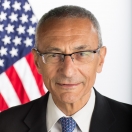
Today, fulfilling a commitment under the President’s Climate Action Plan, the Obama Administration is announcing new private sector commitments and executive actions to reduce emissions of hydroflourocarbons (HFCs), powerful greenhouse gases that exacerbate climate change. Taken together, these commitments will reduce cumulative global consumption of HFCs by the equivalent of 700 million metric tons of carbon dioxide through 2025. That’s an amount equal to 1.5% of the world’s 2010 greenhouse gas emissions—or, in other words, it’s like taking nearly 15 million cars off the road for 10 years.
HFCs, used primarily in air conditioning and refrigeration, are greenhouse gases with up to 10,000 times the global warming potential of carbon dioxide. Unless we act, U.S. emissions of these potent greenhouse gases would nearly double by 2020 and triple by 2030.
Announced today, U.S. industries are leading the way in helping fulfill the President’s pledge by investing billions of dollars to develop and deploy the next generation of safe, cost-effective alternatives to HFCs, and by incorporating these climate-friendly technologies into the cars, air conditioners, refrigerators, foams and other products they manufacture and use.
Across the entire HFC supply chain, from production to manufacturing to retail, American businesses large and small are committing to phase down HFCs and accelerate the uptake of climate-friendly alternatives. For example, industry groups are pledging to support policies to reduce global HFC emissions, to increase research and development spending, and to develop and commercialize HFC alternatives. Chemical companies are pledging to phase down the manufacturing of HFCs and to accelerate production of HFC alternatives. Beverage companies and retailers are pledging to buy HFC-free equipment. For a full list of companies and commitments, please check out our fact sheet.
The Obama Administration is also announcing new federal actions to increase the uptake of safer alternatives to HFCs and encourage the development of new technologies by:
- Promoting HFC alternatives within the federal government, including by updating regulations for contractors and evaluating more sustainable options in federal buildings.
- Encouraging private sector investment in low-emissions technology, including expanding the list of climate-friendly HFC alternatives and organizing sector-specific workshops.
- New research and development funding from the Department of Energy, to encourage next generation, climate- and ozone-friendly cooling and heating, ventilation, and air conditioning systems.
Moreover, earlier this summer, the Environmental Protection Agency proposed two new rules under the Significant New Alternatives Policy (SNAP) Program that would smooth the transition to climate-friendly alternatives to HFCs, including expanding the list of acceptable alternatives and limiting the use of some of the most harmful HFCs where alternatives are available.
All of these actions add to the gathering momentum toward an amendment to the Montreal Protocol, the landmark international agreement signed 27 years ago today to phase out the use of chemicals harmful to the ozone layer, to tackle HFCs on a global scale. Recent studies show the hole in the ozone layer is closing, and reinforce the effectiveness of the Montreal Protocol to phase down harmful pollutants. Importantly, the U.S. and China have already agreed to work together to phase down the consumption and production of HFCs, and G-20 leaders followed suit by expressing their own support for similar measures. And just yesterday, former Indian Minister of Environment Jairam Ramesh called for his country to join a global effort to phase down HFCs under the Montreal Protocol.
The leadership demonstrated today by U.S. industries and the federal government taking on HFCs is welcome news for the planet and will help prompt other countries and companies to take action on climate change.
John Podesta is Counselor to the President.
You should also read:


